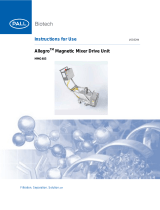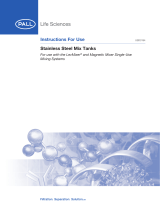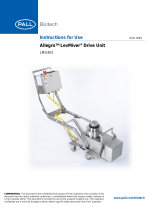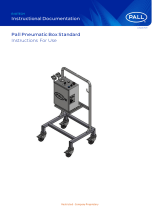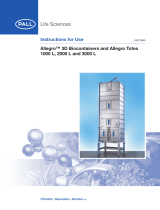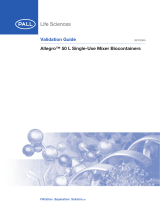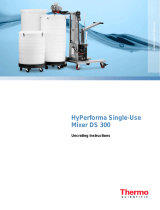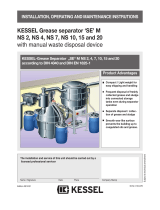Page is loading ...

Restricted - Company Proprietary
BIOTECH
Instructional Documentation
USD 3193a
AllegroTM Cubical LevMixer® and Magnetic Mixer Tanks
Instructions For Use

2
Restricted - Company Proprietary
Contents
1 Safety Symbols and Statements.............................................................................................................................................................................. 3
1.1 Types of Safety Symbols ............................................................................................................................................................................................. 3
1.2 Safety Messages ................................................................................................................................................................................................................ 3
2 Introduction ......................................................................................................................................................................................................................... 4
3 Specifications ...................................................................................................................................................................................................................... 4
4 Unpacking and Setup for First Time Use ........................................................................................................................................................... 7
5 Mixing Biocontainer Installation .............................................................................................................................................................................. 9
6 Coupling the Drive Unit to the Tank ................................................................................................................................................................... 16
7 Mixing Biocontainer Drainage and Disposal ................................................................................................................................................. 17
8 Maintenance and Care ................................................................................................................................................................................................. 17
8.1 Spare Parts and Standard Accessories ......................................................................................................................................................... 18
9 Services ................................................................................................................................................................................................................................... 18
10 Scientific and Laboratory Services ........................................................................................................................................................................ 18
11 Warranty ................................................................................................................................................................................................................................ 18

3
Restricted - Company Proprietary
1 Safety Symbols and Statements
1.1 Types of Safety Symbols
All safety symbols: warning, prohibition, mandatory and Globally Harmonized System (GHS) can / will be
accompanied by additional text and signs to explain the reason for the warning, explain the nature of the
prohibition, and explain the reason for the action.
Table 1
ISO 7010 safety signs and symbols
Color Meaning / Purpose Example Description Instruction and Information
Red Prohibition / Danger
Red ring and diagonal bar with
black symbol on white
background
Specifies behavior that is prohibited
because it would result in an immediate or
potential risk of personal injury or threat to
health / life.
Yellow Warning / Caution
Yellow triangle with black border
and black symbol
Warns of hazards which could result in
personal injury or threat to health.
Blue Mandatory / Information Blue circle with white symbol
Specifies an action required or informs of
information to safeguard personal health
and / or avoid risk of personal injury.
Red GHS Hazards
Red diamond, white background
with a black symbol
Classifies the hazards of chemical products
and communicates health and safety
information.
1.2 Safety Messages
Table 2
Safety signs and symbols within this document
Symbol Instruction and Information
Prior to operating, the instructions must be read in entirety.
Highlights important information regarding instructions for use.
If the unit is transported or stored in temperatures colder than the operating environment it is necessary to wait 1-2
hours to equalize the internal temperatures of the unit before powering on.
Keep the supplied magnetic shields on mixing biocontainers, magnetic chargers, and impellers when not in use.
More than one person is required to move the tank.
The tank should only be moved using the tank handle, and only with the tank/mixing biocontainer empty and the
drive detached.
Identifies a dangerous situation that may result in personal injury.
Do not attempt to move the tank by pulling/pushing the handle of the installed drive unit.
Do not use this equipment in any manner inconsistent with these operating instructions or under any conditions that
exceed the environmental specifications stated.

4
Restricted - Company Proprietary
Persons who have pace makers and implanted medical devices should not operate the equipment.
Caution should be taken. Potential risk to equipment.
For technical assistance contact your Pall representative.
Electrical Safety
The control box should remain closed whist the unit is plugged in.
Contact your Pall representative for any electrical faults.
Strong Magnetic field. Take caution when in close proximity to the impeller.
2 Introduction
The following procedure is provided for the installation of Pall single-use mixing biocontainers with capacities of
50 L, 100 L, 200 L, 400 L, 650 L and 1000 L in the corresponding stainless steel cubical mixing tanks. (For 2000 L
installation procedures refer to Pall document reference USD3197). Pall cubical mixing tanks must be used in
accordance with this manual. The instructions contained in the product documentation should be read
thoroughly because they contain valuable information gained by extensive experience. It is very important that all
instructions in this document are carefully followed and, where appropriate, they should be incorporated into the
user’s standard operating procedures. If some of the procedures do not suit your needs, please consult Pall or your
local distributor before finalizing your system. Use of this product in a manner other than in accordance with Pall’s
current recommendations may lead to injury or product loss. Pall cannot accept liability for such injury or loss.
3 Specifications
All specifications are valid for standard mixing tanks only. Refer to customer approved drawings and specification
for custom mixing tanks, which may deviate from what is stated in this manual.
Standard mixing tanks described in this manual are designed for use with the LevMixer and Magnetic Mixer
single-use mixing biocontainers.
The standard mixing tanks have 4 available configurations:
1. Standard
2. Standard with load cells
3. Standard jacketed
4. Standard jacketed with load cells
All tanks have a push handle on the docking side of the tank.
All tanks, except for the 50 L tanks, have a window door for easy mixing biocontainer installation. 650 L and 1000 L
tanks have a double door.
All tanks, except for the 50 L tanks, have an insert plate for front and bottom tubing. As of 200 L, two bottom insert
plates are included, one closed and one drain insert plate.
Additional options include probe supports, powder port supports, powder bag lifts and closed-loop heater/chillers
for temperature control.

5
Restricted - Company Proprietary
The mixing system can accommodate a variety of standard and custom-designed single-use mixing biocontainers
available from Pall Life Sciences.
These tanks are not designed to be compatible with other mixing technologies nor with biocontainers supplied by
other manufacturers. Modification of these tanks without prior authorization from Pall will immediately void the
warranty
Table 3
Specifications
Part Number Dimensions, mm (inches) W x D x H Weight, kg (lbs)
LEV50NC 836 x 830 x 938 (32.9 x 32.7 x 36.9) 57 (125)
LEV100NC 933 x 964 x 1054 (36.7 x 37.9 x 41.5) 81 (179)
LEV200NC 861 x 895 x 1162 (33.9 x 35.2 x 45.7) 106 (234)
LEV400NC 1079 x 1164 x 1273 (42.5 x 45.8 x 50.1) 151 (333)
LEV650NC 1154 x 1273 x 1442 (45.4 x 50.1 x 56.8) 182 (402)
LEV1000NC 1241 x 1409 x 1597 (48.9 x 55.5 x 62.9) 234 (516)
LEV50JC 818 x 807 x 941 (32.2 x 31.8 x 37.0) 126 (278)
LEV100JC 887 x 894 x 1056 (34.9 x 35.2 x 41.6) 114 (252)
LEV200JC 864 x 847 x 1160 (34.0 x 33.3 x 45.7) 160 (353)
LEV400JC 1060 x 1157 x 1275 (41.7 x 45.5 x 50.2) 230 (507)
LEV650JC 1197 x 1249 x 1444 (47.1 x 49.2 x 56.8) 320 (706)
LEV1000JC 1291 x 1387 x 1599 (50.8 x 54.6 x 62.9) 403 (889)
LEV50NC420SLC 889 x 855 x 1410 (35.0 x 33.7 x 55.5) 70 (155)
LEV100NC420SLC 1238 x 1070 x 1596 (48.7 x 42.1 x 62.8) 165 (364)
LEV200NC420SLC 1231 x 1071 x 1596 (48.5 x 42.2 x 62.8) 188 (415)
LEV400NC420SLC 1266 x 923 x 1595 (49.8 x 36.3 x 62.8) 224 (494)
LEV650NC420SLC 1564 x 1140 x 1562 (61.6 x 44.9 x 61.0) 274 (605)
LEV1000NC420SLC 1615 x 1190 x 1597 (63.6 x 46.9 x 62.9) 324 (715)
LEV50JC420SLC 888 x 862 x 941 (35.0 x 33.9 x 37.0) 147 (325)
LEV100JC420SLC 1239 x 1070 x 1596 (48.8 x42.0 x 62.8) 202 (446)
LEV200JC420SLC 1224 x 1070 x 1596 (48.2 x 42.1 x 62.8) 246 (542)
LEV400JC420SLC 1351 x 983 x 1596 (53.2 x 38.7 x 62.8) 317 (699)
LEV650JC420SLC 1564 x 1109 x 1562 (61.6 x 43.7 x 61.0) 408 (900)
LEV1000JC420SLC 1518 x 1334 x 1598 (59.8 x 52.5 x 62.9) 505 (1114)
Material and Finish
Tank, framing and cabinet material 304L stainless steel
Surface finish
Glass bead blasted: Ra ~ 1.2 pm (47 pin)
Bag contact surface: Ra ~ 0.89 pm (35 pin)

6
Restricted - Company Proprietary
Wheels
4 x locking swivel, except for 50 L tanks on load cells: 2 X locking swivel and
2 X swivel
Wheel material Polyamide
Wheel bracket material 304L stainless steel
Jacketed Models
Jacket type Dimpled, insulated
Operating range Max. 6.2 bar @ -5/90 °C / Max. 90 psig @ 23/194 °F
Jacket connectors Threaded female 1 in. gas
Jacketed sides
50 L: front, right, left, back
100 L – 1000 L: right, left, back
Models with Load Cells
Number of load cells 3
Operator interface type LCD display, membrane keypad
Control box ingress rating IP 65
Voltage 100-230 VAC
Maximum humidity 85%, avoid condensation
Ambient temperature 4-40 °C
Power cord length 600 cm (20 ft.)
Power cord plug options US, EU, Australia, Switzerland, UK
Signal type(s) for remote output 4-20 mA
Load cell accuracy 0.3% of the nominal volume
50 L 0.15 kg (0.33 lbs)
100 L 0.3 kg (0.66 lbs)
200 L 0.6 kg (1.32 lbs)
400 L 1.2 kg (2.65 lbs)
650 L 1.95 kg (4.30 lbs)
1000 L 3 kg (6.61 lbs)

7
Restricted - Company Proprietary
Table 4
Recommended working volumes
Tank Description Minimum Working Volume Maximum Working Volume
50 L Cubical 15 L 50 L
100 L Cubical 20 L 100 L
200 L Cubical 35 L 200 L
400 L Cubical 57 L 400 L
650 L Cubical 76 L 650 L
1000 L Cubical 98 L 1000 L
*Top of impeller exposed. Some mixing effect at smaller volumes.
4 Unpacking and Setup for First Time Use
Take caution when preparing load cells for use.
The tank ships in a wooden crate. Carefully open the crate, unlock the two front brakes, wheel the tank out of the
crate, and position it in the desired working location. The crate should be retained for use if the tank must be
shipped in the future.
Tanks fitted with a heating/cooling jacket may be connected to an external supply of heating/cooling fluid.
Available connection types are female 1 in. gas.
Mobile tanks fitted with integral load cell systems incorporate three (3) load cell assemblies and a weight indicator
unit. These tanks should be located on a level surface and have their wheels locked prior to use.
Each load cell assembly must be prepared and inspected to ensure correct weighing performance. The following
steps are required in preparation for first use (NOTE: exact load cell and mounting kit design and orientation may
vary from those shown – consult the documentation provided with your tank for details of your configuration):
1. Use a hex key, size 3 (≤ 400 L tanks) or 4 (≥ 650 L tanks), to remove the shipping plate from each of
the load cell assemblies (Figure 1). The plates and bolts should be retained for use if the tank must
be shipped in the future.
2. Use a wrench, size 13 (≤ 400 L tanks) or 24 (≥ 650 L tanks) to fully retract the jack bolt (Figure 2, left
image). Confirm that, after retraction, there is a visible gap between the head of the jack bolt and
the opposing mounting plate (Figure 2 and Figure 3, right images) and that the load cell sits
securely in its recess without any looseness or play.
3. Verify by hand that each anti-liftoff plate and rod end bearings (heim/rose joint) freely (Figure 4).
Binding in these assemblies can cause inconsistent weight readings or problems with return to
zero.
4. Connect the power cord and secure with the threaded collar (Figure 5).
5. Plug the power cord into the appropriate power outlet. Verify that the load cell indicator responds
to applied loads as expected, and that it returns to zero consistently. Refer to supplied load cell
manual for detailed instructions.

8
Restricted - Company Proprietary
6. Each load cell is supplied pre-calibrated with a certificate. Following installation, calibration should
be confirmed or repeated according to user organization requirements. Repeat calibration service is
available directly from the load cell supplier. Contact Pall for details.
Figure 1
Removing load cell shipping plate
Figure 2
Jack bolt adjustment and inspection
Figure 3
Section view of locked position for transport (left) and open position for use (right)

9
Restricted - Company Proprietary
Figure 4
Anti-Liftoff plate and rod end bearing
Figure 5
Attaching the load cell power cord
5 Mixing Biocontainer Installation
The procedure described below is intended for LevMixer and Magnetic Mixer single-use mixing systems and mixing
biocontainers only.
1. Prior to mixing biocontainer installation, inspect the mixing biocontainer-contact surfaces of the
tank to ensure they are clean, dry and free from material or defects that might damage the mixing
biocontainer surface.
2. If a LevMixer or Magnetic Mixer drive unit is coupled to the tank, remove the drive unit before
proceeding.
3. Apply the caster locks to ensure the tank will not move during mixing biocontainer installation.
4. If appropriate, open the chamber access door(s) to allow operators access to the tank interior.
5. Ensure that a drive-biocontainer interface (Figure 6) is installed in the drive port hole on the bottom
of the tank. If not, install the interface by inserting it from the bottom and securing it in place using
the supplied O-ring. Ensure that the interface is fully engaged in the drive port and that the O-ring
is completely installed in the corresponding O-ring channel on the side of the interface (Figure 7).

10
Restricted - Company Proprietary
Figure 6
Drive-Biocontainer interface and O-ring
Figure 7
Interface installation in a drive port
6. Locate the magnetic clamp and centering aligner (Figure 8). These parts are required for proper mixing
biocontainer installation and alignment. Inspect the centering aligner for damage; if the center hole is
deformed, torn or not concentric, discard and replace with an undamaged centering aligner. Assemble the
clamp and aligner as shown in (Figure 9).
Figure 8
Magnetic clamp (left) and centering aligner (right)

11
Restricted - Company Proprietary
Figure 9
Magnetic clamp assembled with centering aligner
Mixing Biocontainer and drive Units are not interchangeable.
Do not use scissors or other cutting implements
7. Select a LevMixer or Magnetic Mixer single-use mixing biocontainer according to the drive type you plan to
use. Verify the correct article code and expiration data. Remove the outer and inner packaging by tearing
open at the Easy Tear notch (Figure 10). Retain the label from the inner packaging according to the user
organization’s Quality policies
Figure 10
Opening packaging bags via the Easy tear notch
8. Visually inspect the mixing biocontainer for shipping damage or imperfections; cuts, tears, or punctures;
film cracks that are externally rough / sharp to the touch (note: white creases that are not sharp to the touch
are typically not a cause for concern); impeller detached from impeller seat/post; kinked tubing that cannot
be unkinked; damaged, missing or detached subcomponents. If any such imperfections are discovered,
contact Pall or the user organization’s Quality group for advice on whether the mixing biocontainer should
be used.
9. A blue shipping disc is magnetically attached to the outside of the mixing biocontainer, over the impeller
seat. Remove the blue shipping disc (Figure 11) (retain this item; it will be used to secure the impeller during
subsequent mixing biocontainer disposal). Place the magnetic clamp / centering aligner assembly over the
impeller seat, ensuring the hole in the centering aligner lines up with the post on the seat. The clamp will be
magnetically attracted to the impeller and will secure the assembly to the impeller seat when properly
installed (Figure 12).

12
Restricted - Company Proprietary
Figure 11
Removing the shipping disc
Figure 12
Mixing biocontainer with magnetic clamp / aligner assembly
10. Place the mixing biocontainer into the tank, ensuring the magnetic clamp/centering aligner are inserted
through the drive-biocontainer interface at the bottom of the tank (Figure 13).
Figure 13
Aligning metallic clamp with drive-biocontainer interface
11. Locate the bottom drain hose and pass it through the drain port cut-out of the tank (Figure 14).

13
Restricted - Company Proprietary
Figure 14
Positioning the mixing biocontainer drain
12. Align any side sample ports, sensors and/or tubing with the corresponding port cut-out of the tank, and
gently pull the tubing through the cut-out without putting excessive force on the ports. Ensure the ports,
sensors and/or tubing are properly aligned for clear access, and that the tubing is not pinched or kinked.
13. Install the included tank insert plates in the corresponding port cut-out of the tank (Figure 15).
Figure 15
Tank insert plates installed
14. Before filling the mixing biocontainer, ensure that all tubing clamps on the bottom and side outlets are
securely closed.
15. If the mixing biocontainer incorporates an EZ Drain fitment, position it in the drain port cut-out, install the
drain insert plate (see above, Figure 15), and then snap the EZ Drain clip over the fitment OUTSIDE the tank
(Figure 16 and Figure 17).

14
Restricted - Company Proprietary
Figure 16
EZ drain clip installed
Figure 17
EZ drain clip installed outside of the tank
16. Confirm that the drain is fully closed by sliding the locking collar up until it clicks, then pulling down firmly
on the blue BarbLock to close the drain, and sliding the locking collar down again to lock it (Figure 18).
Figure 18
Moving from open to closed (stops fluid flow)
In the case of mixing biocontainers being installed in tanks larger than 200 L, the drain fitment may not initially align
fully with the drain port cut-out; in such circumstances, carefully guide the drain fitment into position during the
filling/inflation step.

15
Restricted - Company Proprietary
17. OPTIONAL: Prior to filling with liquid, an inert gas or air may be introduced through one of the top ports to
pre-inflate the mixing biocontainer. Pre-inflation for a contained or sterile application should be done only
via a sterilizing-grade vent filter integral to the mixing biocontainer.
18. OPTIONAL: Any sensors (pH, conductivity probe etc.) should be installed before filling the mixing
biocontainer. A temperature pt-100 probe can be installed after since it is not fluid contact.
19. Start filling the mixing biocontainer per process requirements. If the mixing biocontainer has been pre-
inflated with gas or air, make sure that at least one top port is open to act as a vent for the displaced air to
avoid the risk of over-pressurization. Venting for a contained or sterile application should be done only via an
adequately sized sterilizing-grade vent filter integral to the mixing biocontainer.
20. During the filling process, gentle adjustments to the mixing biocontainer orientation may be made until
20% of maximum volume or 50 L (whichever is smaller) of liquid has been added. Avoid using excessive
force during mixing biocontainer adjustment to prevent inadvertently damaging the mixing biocontainer
assembly. Minor wrinkles generally do not impact mixer performance.
21. In the case of larger tanks with access doors, the doors should be securely latched closed before the liquid
level reaches their sills (Figure 19). Appropriate precautions should be taken to ensure the tank doors are not
opened while the mixing biocontainer is full.
Figure 19
Liquid Level reaching the door sills
Do not exceed recommended biocontainer capacity.
22. Continue filling the mixing biocontainer to the desired level (see Table 4). Stop filling the mixing
biocontainer once it appears close to fully inflated. Take care not to over-inflate the mixing biocontainer.
23. Once filled, the tank should not be moved, and all four wheels should be in contact with the floor.
24. For drainage and disposal guidelines, see section 7.

16
Restricted - Company Proprietary
6 Coupling the Drive Unit to the Tank
Coupling of the drive unit to the tank should be performed only when the installed mixing biocontainer is filled
with fluid to at least the minimum working volume. No coupling should be attempted with an empty or dry
mixing biocontainer as the impeller may damage the mixing biocontainer.
1. Remove the magnetic clamp (Figure 12) from the mixing biocontainer-tank assembly before
coupling the drive. To remove the magnetic clamp, reach underneath the drive port and carefully
pull the magnetic clamp downwards until it is free from the mixing biocontainer-tank assembly.
2. Make sure that the drive unit has a latch installed in the correct position to match the rail port
intended for connection. See the drive user manual for corresponding latch and port positions.
3. Carefully press down on the drive handle and raise the front wheels off the ground (direction A as
shown on the second step of Figure 20).
4. Align the guide bearings on the drive port with the tank guide rails.
5. Roll the drive unit along the rails all the way until the bearings rest in the notch located at the end of
the rails (direction B).
6. Using the drive unit handle, lift the drive unit to a horizontal position (direction C). While holding the
drive unit in this position, pivot the latch toward the tank so that the crossbar rests on the hooks in
the guide rails (direction D as shown in the fourth step of Figure 20).
Do not move the tank by pulling / pushing the handle of the installed drive unit
Figure 20
Coupling of drive unit to tank (LevMixer drive unit shown)
The tank should only be moved using the tank handle, and only with the tank/mixing biocontainer empty and the drive
detached.

17
Restricted - Company Proprietary
7 Mixing Biocontainer Drainage and Disposal
After the mixing process is completed, the mixing biocontainers contents may be drained and the empty mixing
biocontainer responsibly disposed of. The following general guidelines apply and should be used in conjunction
with all safety and environmental regulations appropriate for the process and location.
1. To discharge the mixing biocontainer, connect the drain hose to an appropriate receptacle then
open the drain tubing clamp. If fitted, the EZ Drain valve should be opened by pushing the locking
collar upwards until it clicks, then pushing up on the blue BarbLock to open the drain and pulling
the locking collar down again to lock it (Figure 21).
Figure 21
Moving from closed to open (allows fluid flow)
DO NOT DELETE NEXT SECTION BRE
2. After the bag has drained, any residual liquid can be recovered by gently lifting the bag so as to direct the
residual liquid to the drain.
3. Close all clamps and detach the mixing biocontainer from all external connections, detach the mixer drive,
remove the EZ Drain clip (if used) then carefully lift the empty mixing biocontainer out of the tank.
4. Place the shipping disc (removed during mixing biocontainer installation) over the impeller fitment to
secure the impeller and prevent it from being attracted to external steel objects.
5. Dispose of the mixing biocontainer according to applicable EH&S policies and regulations. Incineration is a
popular method of disposal because the temperatures involved will de-magnetize the impeller and
shipping shell.
8 Maintenance and Care
Mixing tanks are designed to operate with minimal maintenance.
To clean, wipe down the tank surfaces using water and a mild detergent solution. Standard tanks are constructed
from 304-alloy stainless steel, which may be vulnerable to corrosion if exposed to corrosive chemicals or if left in in
persistent contact with moisture. Appropriate precautions should be taken to prevent such corrosion. If corrosive
conditions are routinely anticipated, end users should consider opting for tank systems constructed from 316-alloy
stainless steel (available from Pall upon request).
It is recommended that heating/cooling fluid be drained completely from the jacket (if fitted) before transporting
or storing the tank for long periods of time.
Tanks with integral load cell systems should be periodically checked for correct operation in accordance with the
user organization’s Quality policies.
Return the tank to its original crate, with supplied bracing in place, prior to shipping.
Periodic maintenance is recommended to keep the tank in reliable working condition. Recommended preventive
maintenance procedures are listed in Table 5.

18
Restricted - Company Proprietary
Table 5
Preventative maintenance procedures
Description Frequency Spare Parts Involved Responsible
Load cell Calibration Annually None Service or Metrology
8.1 Spare Parts and Standard Accessories
Table 6
Spare parts and accessories
Description Pall Part Number
Drive-biocontainer interface LT-DBBI009
Interface O-ring LT-DBBI004
Centering aligner LT-SVSP304
Magnetic clamp type 2 LT-SVSP309
Power Cord:
US
EU
AU
SW
UK
LT-SVSP365
LT-SVSP366
LT-SVSP367
LT-SVSP368
LT-SVSP369
Powder port support: > 50 L to 1000 L 215-18686-00
Probe support:
50 L
> 50 L to 1000 L
215-18756-00
215-18493-00 or
215-18880-00 (depending on the mixing biocontainer)
Plate, clip for 1 in. drain valve, non-sterile 4100153NS
Powder bag lifts: Medium Large
LGRMXPBSM
LGRMXPBSL
9 Services
The mixing tank was developed exclusively for mixing fluids, and solids in fluids, in specially designed disposable
mixing biocontainers. The tank should only be used for this purpose to ensure a long service life.
Should your tank require service, please contact your local sales team.
10 Scientific and Laboratory Services
Pall operates a technical service to assist in the application of all its products. This service is readily available to you
and we welcome your questions so that we can help. In addition, a full network of technical representatives is
available throughout the world.
11 Warranty
Pall warrants that the Allegro systems manufactured by Pall, when properly stored and installed, and operated as
per the specifications and design conditions stated in this document will be free from defects in material and
workmanship during their shelf life. Pall liability under any warranty is limited solely to replacing or issuing credit
for the Allegro systems that may become defective during the warranty period.

19
Restricted - Company Proprietary

Visit us on the Web at
www.pall.com/
Biotech
Contact us at www.pall.com/contact
Pall Corporation has offices and plants throughout the world. To locate the Pall
office or distributor nearest you, visit www.pall.com/contact.
The information provided in this literature was reviewed for accuracy at the
time of publication. Product data may be subject to change without notice. For
current information consult your local Pall distributor or contact Pall directly.
IF APPLICABLE Please contact Pall Corporation to verify that the product
conforms to your national legislation and/or regional regulatory requirements
for water and food contact use.
© Copyright 2021, Pall Corporation. Pall, , Allegro and LevMixer are
trademarks of Pall Corporation. ® Indicates a trademark registered in the USA.
BarbLock is a trademark of Saint-Gobain Corporation.
USD3193A / Dec ‘21
Corporate Headquarters
Port Washington, NY, USA
+1-800-717-7255 toll free (USA)
+1-516-484-5400 phone
European Headquarters
Fribourg, Switzerland
+41 (0)26 350 53 00 phone
Asia-Pacific Headquarters
Singapore
+65 6389 6500 phone
Restricted - Company Proprietary
/
